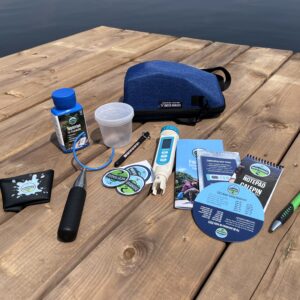Calcium in freshwater
What is calcium?
Calcium is a mineral that is often found naturally in freshwater environments. Under natural conditions, rocks wear down and calcium is dissolved into the water, but this process is slow!

Why is calcium important for freshwater?
Each body of water has its own normal calcium level based on its bedrock. Some aquatic creatures depend on calcium for their body functions, in particular crustaceans and molluscs who use it to build their shells. Acid rain, deforestation and climate change cause lakes to lose vital calcium and some lakes have fallen below healthy thresholds (especially on the Precambrian Shield in Canada). This has resulted in a loss of dominant plankton species.
What does a calcium measurement mean?
It depends! A baseline for calcium and historical information about your bedrock can give you more information.
- Calcium levels below 10ppm mean your water is soft! Your pH is more easily influenced by things like acid rain
- Natural calcium levels above 40ppm mean invasive species like zebra mussels can reproduce
- Declining calcium levels and climate change can also lead to low oxygen levels in the deeper parts of lakes
Water Rangers Protocol
We measure calcium and magnesium as part of hardness using our test strips. We don’t have a test for calcium on its own yet, but it is one we’d like to include. If you’ve used an accessible calcium test, please let us know.
-
 Compact Freshwater Testkit$119.00
Compact Freshwater Testkit$119.00 -
 Teststrips$15.00
Teststrips$15.00
